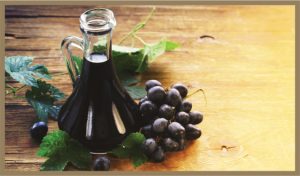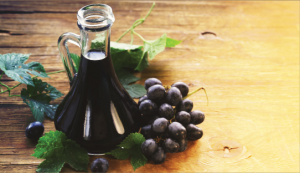 There’s something distinctly soothing about the rich, sweet flavor of true, traditionally aged balsamic vinegar.
There’s something distinctly soothing about the rich, sweet flavor of true, traditionally aged balsamic vinegar.
Today, food-conscious Americans are making it a staple in their pantries, as Italians have for generations. Recent studies have shown the great health benefits for reducing cholesterol and regulating insulin levels, for example.
Vinegar has its powers. The Romans used vinegar as an antiseptic, using it to heal the wounds of soldiers, and it’s long been recognized as a natural digestive aid due to what we now know is related to probiotics, which many of us address through expensive dietary supplements for optimal gut-health.
It’s remarkable how some grapes react in our bodies. The very name balsamic means “balsam-like” in the sense of being “restorative” or “curative.” While wine is made from fermented grapes, balsamic is created from the careful fermentation of the “must” — whole pressed grapes complete with juice, skin, seeds and stems. Truly traditional balsamic is crafted from Trebbiano grapes fermented, as they have for generations, over time in wood barrels in Reggio Emilia and Modena, Italy.
Take care not to fall prey to false claims about 25- or 50-year-old balsamics, because they rarely exist and Italian regulations prevent producers from making any age claims on their labels. The quality of the grapes at harvest, specifically late harvest, when they develop their true complexities with less water and more flavor, play a far more significant role in the final product than old age. In fact, those claims don’t make sense due to to evaporation rates.
At Gustare, we exclusively offer balsamic vinegar, such as our 18-year Traditional, Fig or Pomegra nate (to name a few), created through that traditional process with no vacuum evaporation, caramel color, refined sugars or thickeners. Imitation balsamics on American supermarket shelves present a similar dilemma to what we face with many charlatan “extra virgin” olive oil brands, which include many bad actors with limited health benefits.
nate (to name a few), created through that traditional process with no vacuum evaporation, caramel color, refined sugars or thickeners. Imitation balsamics on American supermarket shelves present a similar dilemma to what we face with many charlatan “extra virgin” olive oil brands, which include many bad actors with limited health benefits.
Many products out there are essentially white wine vinegar with a splash of caramel coloring, which includes cancer-causing carcinogens in sodas, according to some researchers. Understanding the integrity of that fermentation process is critical to maximizing balsamic vinegar’s health benefits, which include:
Destroys free radicals and fights cancer
Antioxidants from balsamic vinegar destroy free radicals and protect healthy cells, limiting exposure to cancer, premature aging and hardening of arterial walls. This provides a natural deterrent to infectious diseases and inflammations (yes, it’s also a pain reliever). Balsamic vinegar also contains polyphenols, which are also anticancer agents.
Reduces risks of heart attacks
Balsamic vinegar is low in saturated fat and is believed to reduce cholesterol. Moreover, since it is low in sodium, it enhances heart health and reduces high blood pressure.
Controls diabetes
The American Diabetes Association has reported how vinegar improves insulin sensitivity carbohydrate-heavy meals in subjects with insulin resistance or Type 2 Diabetes. Research also has revealed how five teaspoons of balsamic vinegar a day enhances insulin sensitivity.
Assists digestion
Polyphenols in balsamic vinegar stimulate the activity of pepsin enzyme in the body. Pepsin is a digestive enzyme, which helps break proteins into smaller units (amino acids) through more efficient absorption. Unlike other vinegars, balsamic is a pleasure to taste. We enjoy a drizzle on fresh berries or stir into plain Greek yogurt for a healthful breakfast. A taste of Gustare Strawberry or Cape Cod Cranberry Pear balsamic vinegar will brighten up a salad of fresh garden greens.
This article authored by Gustare Oils & Vinegars first appeared in Cape & Plymouth Business’s Health & Wealth magazine (Fall 2015).



 There’s something distinctly soothing about the rich, sweet flavor of true, traditionally aged balsamic vinegar.
There’s something distinctly soothing about the rich, sweet flavor of true, traditionally aged balsamic vinegar. nate (to name a few), created through that traditional process with no vacuum evaporation, caramel color, refined sugars or thickeners. Imitation balsamics on American supermarket shelves present a similar dilemma to what we face with many charlatan “extra virgin” olive oil brands, which include many bad actors with limited health benefits.
nate (to name a few), created through that traditional process with no vacuum evaporation, caramel color, refined sugars or thickeners. Imitation balsamics on American supermarket shelves present a similar dilemma to what we face with many charlatan “extra virgin” olive oil brands, which include many bad actors with limited health benefits.





